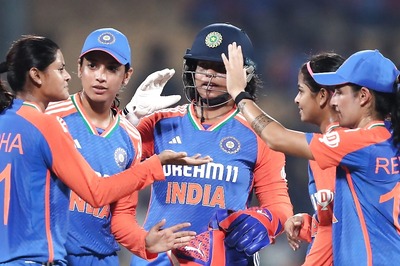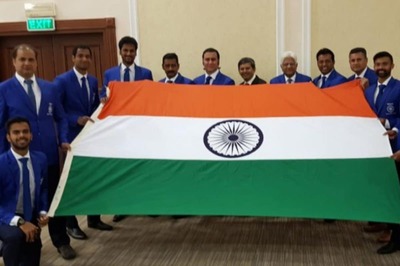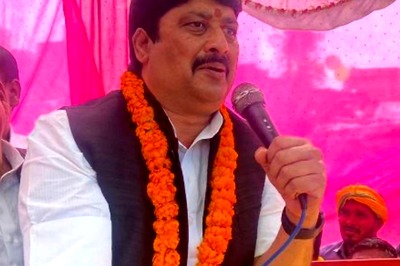
views
The Centre on Thursday notified norms to regulate the online gaming sector wherein real money games involving wagering or betting have been prohibited.
The government has also opted for a self-regulation model for the online gaming sector and will initially notify three self-regulatory organisations that will approve the games that can operate in the country as per the rules.
Online games involved in wagering or betting will fall foul of new online gaming rules, Minister of State for Electronics and IT Rajeev Chandrasekhar told reporters here.
“Permissible online games are those games, real money or otherwise, that do not involve wagering, user harm in its content and do not create any addictive consequences for children,” Chandrasekhar said.
What Do the New Rules Say?
Chandrasekhar said that the online games will be regulated by SROs which will include industry, gamers and other stakeholders and not the government.
The SROs as per the rules should also include an educationist, an expert in the field of psychology or mental health, an individual who is or has been a member or officer of an organisation dealing with the protection of child rights etc.
“This is an enabling framework to allow the serious and significant expansion in the online gaming space in India which is a very big opportunity,” the minister said.
The online gaming rules have been included as an amendment in the IT Rules of 2021.
According to the rules, the online gaming self-regulatory body may declare an online real money game as a permissible online real money game, if “the online real money game does not involve wagering on any outcome”.
The minister said that the SROs will be denotified if they don’t follow the rules.
What About Betting Games?
When asked about some apps that promise monetary rewards on the outcome of IPL cricket matches, the minister said that real money gaming is permitted but it will become non-permissible when money is put on the outcome of the game and any SRO allowing such games will be violating the rules.
Under the notified rules SROs will have to publish a framework to safeguard users against the risk of gaming addiction, financial loss and financial fraud on its website.

The framework should include repeated warning messages at a higher frequency beyond a reasonable duration for a gaming session and provision to enable a user to exclude himself upon user-defined limits being reached for time or money spent.
Some states have barred online fantasy gaming platforms after complaints of suicide and addiction of people in their jurisdiction.
Chandrasekhar said that any state which is legitimately trying to crack down on betting or gambling will find that these rules are not “ultra vires” to whatever they are doing.
“Any jurisdiction which is trying to chop and slice based on some criteria that is beyond betting and being selective in terms of what is legal and illegal then certainly we have made it very clear what is permissible and what is not permissible,” the minister said.
Games involving real money will need to comply with KYC norms as per the rules.
Explained
The terms “social media intermediary and major social media intermediary” were replaced with “a social media intermediary, a significant social media intermediary, and an online gaming middleman” in the 2023 changes. There is also some overlap between online games and social media intermediaries, such as games available or accessible through social media platforms or through social media accounts that allow posting or sharing of achievements, and so on, explains a report by CNBC-TV18.
The new guidelines define an an online gaming intermediary to be any intermediary that “enables the users of its computer resource to access one or more online games”. The remaining sections establish a regulatory framework for online gaming and misinformation.
The earlier rules covering social media intermediaries remain in effect, with a few additional clauses added — no wagering on the outcome of any game will be permitted, though users can still play real money online games, which are defined as “an online game where a user makes a deposit in cash or kind with the expectation of earning winnings on that deposit” for the purposes of the notification.
The Centre passed the Information Technology (Intermediary Guidelines and Digital Media Ethics Code) Amendment Rules, 2022 last year, which require a social media firm, known as an intermediary, to guarantee that users do not post or share information that does not belong to them. The IT guidelines also require the intermediary to verify that the content placed on its platform is not obscene, pornographic, paedophilic, intrusive of another’s privacy, hate speech, encouraging criminal activities, or endangering “India’s unity, integrity, defence, security, or sovereignty,” the report says.
What Did Industry Experts Say About the New Rules?
The industry on Thursday said the new rules for online gaming will spur innovation, boost investor confidence and weed out gambling platforms while making the sector globally competitive, as per a PTI report.
The norms are expected to help reduce regulatory fragmentation at the state level, and foster a more stable business environment, the industry said in one voice as it described the regulations as “watershed moment”, “game-changer” and “landmark”.
All India Gaming Federation (AIGF) termed it a decisive first step for comprehensive regulation for online gaming, one that will propel the industry to compete globally, while WinZO games said the move “truly brings the dawn of a global gaming industry right here in India”.
“…we are grateful to MeitY (IT Ministry) for notifying the amendments to regulate online gaming under the Indian Information Technology Act, and acknowledging the long-standing demand of the gamers and the online gaming industry,” Roland Landers, CEO, All India Gaming Federation said.
The government recognised the industry demands and provided light touch, but comprehensive regulations, which will support innovation, boost Create in India and Brand India, and propel India’s Techade, Landers said.
According to All India Gaming Federation, the rules will go a long way in promoting consumer interest while helping the industry grow responsibly and transparently, and will also help in curbing the menace of anti-national and illegal offshore gambling sites, which have been proliferating in the last few years.
“We look forward to assisting the industry transition to the self-regulatory model envisioned under the rules and use learnings from the years of work that has been undertaken at the All India Skill Games Council (AIGSC), the oldest and largest voluntary self-regulatory body for online gaming,” Landers said.
The government maintained “a very open and transparent approach” throughout this process and heard various stakeholders across the online gaming eco-system since May 2022, AIGF said pledging its support to the government in making online gaming a cornerstone of USD 1 trillion digital Indian economy.
Mobile Premier League (MPL) described the release of the new online gaming rules as a watershed moment for the industry “as it recognises online gaming intermediaries and distinguishes them from gambling”.
“The rules will go a long way in helping us realise our PM’s vision for India to become a global leader in gaming and also contribute to the continued success of Brand India and Create in India,” Sai Srinivas, CEO and Co-Founder of MPL, said.
The uniform legal framework provided by these rules will boost investor confidence.
“We anticipate that this will also help reduce regulatory fragmentation at the state level as also mentioned by the Hon’ble Minister, create a more stable business environment and weed out gambling platforms,” MPL’s Srinivas said.
He said that with the transition to the self-regulatory model that will be recognised by MeitY, MPL looks forward to working collaboratively with industry peers and other stakeholders.
“We believe that this effort will help to create a sustainable and thriving gaming ecosystem in India,” Srinivas said.
Paavan Nanda, Co-Founder of WinZO games said the central, light-touch regulatory mechanism, is a game-changer for the world’s largest gaming market, India.
“The overall recognition of Online Games of Skill by way of inclusion as the third form of intermediary after Social Media, and content-related publishers/OTT players, is beneficial for GST differentiation from gambling, providing the required stability of regulation, and facilitating a level playing field for all games of skill,” Nanda said.
WinZO games praised the Center for taking very strong measures to protect Indian Consumers from illegal offshore betting and gambling under these provisions.
“The draft empowers the Government, via MEITY, to take the necessary steps to determine if an online platform is a gaming platform or a betting platform and accordingly initiate immediate action against betting platforms particularly the offshore betting platforms under section 69(a) of the IT Act,” said Nanda of WinZO games.
This is very positive news for both the industry and the end consumer, creating a safe and accountable internet.
Nitish Mittersain, Founder and CEO of Nazara Technologies said the rules notified are landmark steps that will immensely help the gaming industry and provide lot of clarity on the sector.
Ranjana Adhikari, Partner at IndusLaw said that the online gaming rules are a positive step in the right direction and put the central government in the driver’s seat for online gaming regulation.
“The light-touch approach and the self-regulatory mechanism proposed by the central government is progressive and keeps the law nimble for a fast-paced and evolving industry,” as per IndusLaw.
With inputs from PTI
Read all the Latest Explainers here




















Comments
0 comment